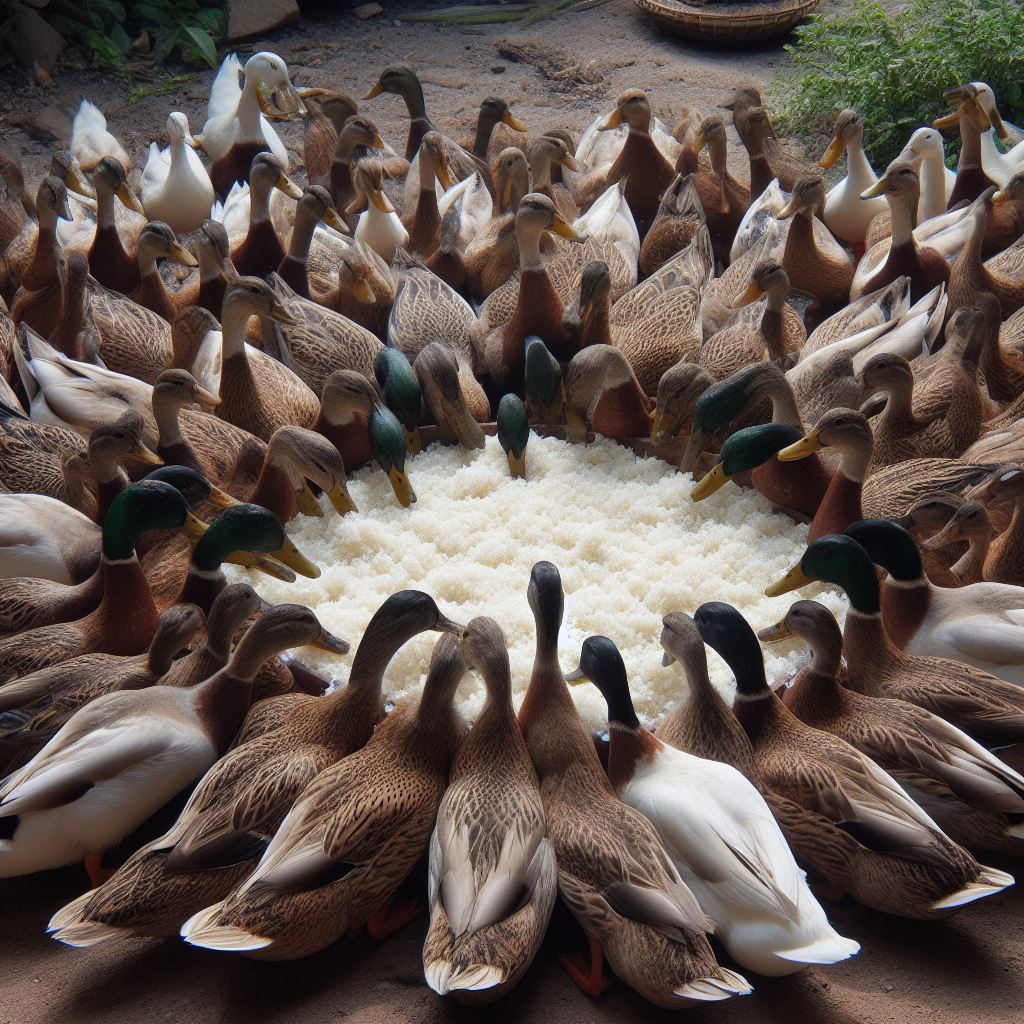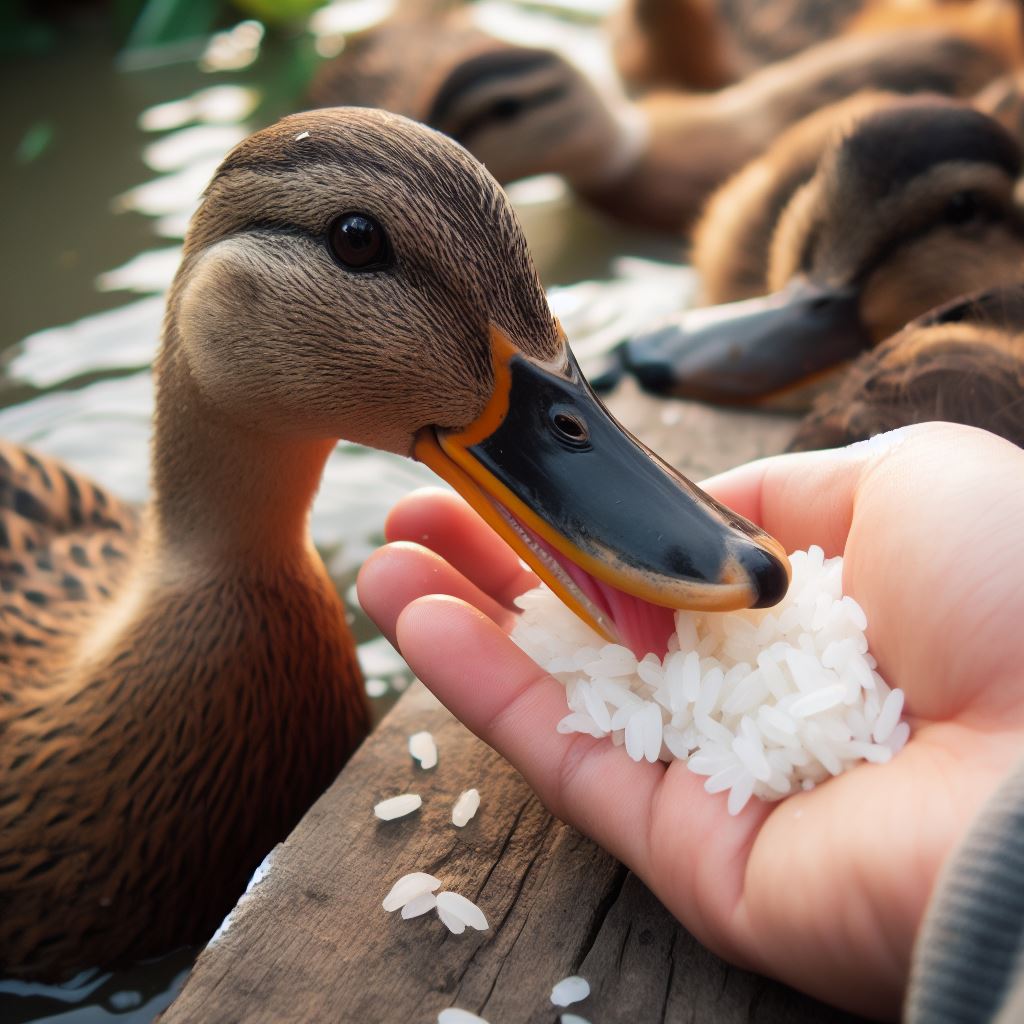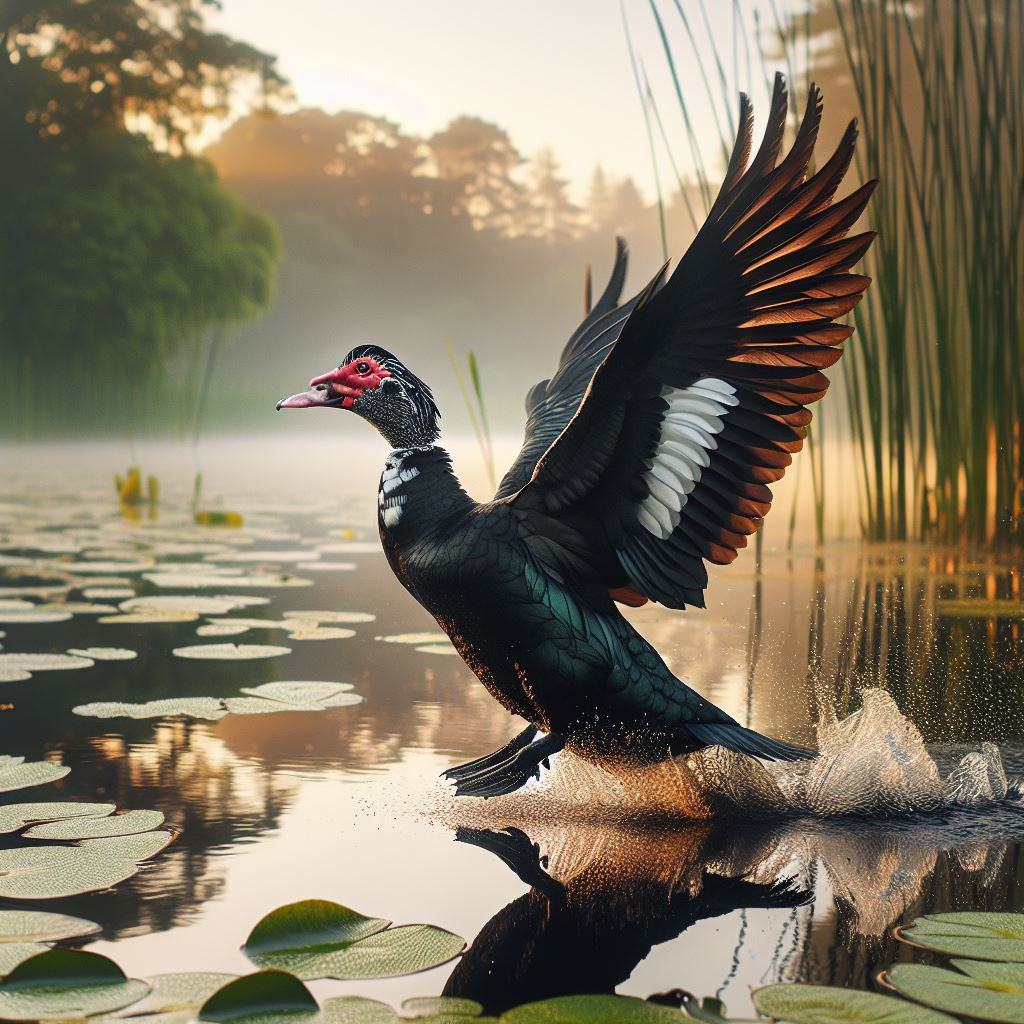Can Ducks Eat Rice? What You Need to Know

Table of content:
Can Ducks Eat Rice? Rice is a common leftover food that many people may consider feeding to ducks. However, there are important factors to consider before offering rice to ducks. This comprehensive guide provides key information to help you make an informed decision about whether or not to feed ducks rice.
Key Takeaways:
- Rice expands in ducks’ stomachs and can cause health issues. Cooked rice is safer than dry rice.
- Small amounts of cooked rice are okay as an occasional treat. Don’t make it a dietary staple.
- Consider more nutritious duck feed options like seeds, vegetable scraps, and duck feed pellets.
- Avoid feeding ducks moldy, salty, or instant rice. Opt for plain cooked rice instead.
- Don’t overfeed. Offer only what ducks can consume in 5-10 minutes.
- Never force ducks to eat rice or any human food. Let them reject it if uninterested.
Rice is a starchy, carbohydrate-rich grain that is a common part of many people’s diets. Since it’s also a readily available leftover food, some people consider feeding cooked rice to ducks. However, there are important factors to weigh before offering rice to ducks.
Is Rice Good or Bad For Ducks?
The answer is not straightforward. Rice does not provide much nutritional value for ducks compared to foods like seeds, greens, and insects. However, small amounts of plain cooked rice are not harmful to ducks in moderation.
The main risk with feeding ducks rice is potential digestion issues. All waterfowl have expansive crops and gizzards designed to expand and help grind up fibrous foods. Rice can absorb water and expand rapidly, potentially causing crop impaction and discomfort. This is especially true if dry, uncooked rice is fed to ducks.
For this reason, organizations like The Humane Society advise:
“Ducks should not be fed dry, uncooked rice. The rice expands in the duck’s stomach and can cause health issues… Cooked rice does not expand as much as uncooked rice.”
So while ducks can eat rice, it does pose some risks and is not an ideal dietary choice compared to more nutritious options. Follow portion guidelines and focus on moderation and variety if you do choose to feed ducks rice.
 Rice Feeding Guidelines For Ducks
Rice Feeding Guidelines For Ducks
Here are some key rice feeding guidelines for ducks to keep in mind:
- Stick to small amounts – Rice should be an occasional treat, not a dietary staple. Offer only what ducks can consume in 5-10 minutes.
- Always cook rice first – Cooked rice poses less risk and won’t expand as much in ducks’ stomachs.
- Avoid instant or flavored rice – Salt and seasonings make rice unhealthy. Use plain cooked white or brown rice.
- Don’t force-feed – Let ducks reject rice if they don’t want it. Never force ducks to overeat.
- Focus on variety – Rotate rice with more nutritious feed like seeds, vegetable scraps, and duck pellets.
- Never feed moldy rice – Discard moldy rice as it can contain toxins harmful to ducks.
- Rinse first – Rinsing rice removes extra starch that causes expansion in ducks’ crops.
Following these tips helps minimize risks when selectively feeding small amounts of rice to ducks.
Healthier Duck Food Alternatives
While the occasional bit of rice won’t harm ducks, there are much healthier food alternatives to offer ducks for better nutrition. Here are some of the top options:
Duck feed pellets – Specially formulated pellets provide balanced nutrition for ducks. Look for a reputable duck feed brand.
Seeds – Black oil sunflower seeds, millet, flax seeds, and other varieties offer healthy fats, protein, and fiber.
Greens – Chopped kale, spinach, lettuce, swiss chard, are nutritious leafy additions. Rinse well.
Vegetable scraps – Unsalted cooked veggies like carrots, yams, squash, peas, corn. Remove rinds, salt.
Fruit scraps – Chopped apple, berries, melon, grapes. Remove peels, pits, and stones.
Insects – Ducks forage for protein-rich insects. Offer dried mealworms or crickets from pet stores.
Varying ducks’ diet across these food groups helps provide balanced nutrition and enrichment. Avoid over-feeding any one item, rice included.
Are There Benefits To Feeding Ducks Rice?
The benefits of feeding ducks rice are limited. Rice provides:
- Energy from carbohydrates. However, seeds, fruits, and veggies offer nutrition too.
- A filling effect thanks to its starch and fiber. But excess rice can overly fill ducks’ crops.
- An enjoyable treat for some ducks who find rice appealing as part of a varied diet.
So while rice can provide some energy and temporary satiation, its nutritional value is minimal compared to alternatives. Any benefits are only seen when rice is fed in moderation as part of a diverse diet.
Key Risks of Feeding Ducks Rice
While properly cooked rice won’t immediately harm ducks in small servings, there are some key risks to keep in mind:
- Overfeeding – Excess rice fills up ducks limiting nutritious foods and leading to obesity.
- Crop impaction – The crop can become clogged and swollen with excess dry, uncooked rice.
- Angel wing – Waterlogged rice may contribute to angel wing deformities in young ducks.
- Nutritional deficiencies – Rice lacks proper protein, vitamins, minerals ducks need for health.
- Pollution – Uneaten rice fouls waterways. Soak first or feed on land.
- Delayed digestion – The gizzard struggles to break down fibrous rice hulls and seeds.
- Obesity – High carbohydrate starch and limited nutrients lead to weight gain in ducks.
- Botulism risk – Moldy rice can harbor botulism bacteria and toxins.
Due to these risks, rice should never be a duck’s primary food source. Follow the proper guidelines to feed rice safely in strict moderation.
 Do Wild Ducks Eat Rice?
Do Wild Ducks Eat Rice?
Ducks encounter rice when feeding near flooded rice paddies and grain fields. However, rice is not a normal part of most wild ducks’ natural diets. The types of foods ducks are adapted to digest include:
- Aquatic plants (duckweed, water lilies, eelgrass, algae)
- Seeds (millet, smartweed, rushes, grasses, sedges)
- Insects (dragonflies, damselflies, mayflies, beetles)
- Aquatic invertebrates (shrimp, snails, tadpoles, small fish)
- Berries and fruits near shorelines
These protein-rich, high-fiber foods provide balanced nutrition to wild ducks. Rice grains are a non-essential starch source ducks only opt to eat opportunistically near farms.
While not toxic, rice lacks the vitamins, minerals, fiber, and protein essential to duck health that its natural diet provides. This is why overfeeding of rice and bread should be avoided.
Frequently Asked Questions About Feeding Ducks Rice
Can baby ducks eat rice?
Feeding a small amount of rinsed, cooked rice to fully feathered juvenile ducks is okay on occasion. However, uncooked rice should be avoided for young ducklings. Chick starter feed is more suitable.
Do ducks eat rice paddies?
Ducks will opportunistically nibble on rice grains in flooded paddies. However, rice is not a preferred food. Ducks focus more on snails, insects and seeds found in rice fields. Eaten occasionally, rice grains won’t harm wild ducks.
Is brown or white rice better for ducks?
Both types are safe for ducks if properly cooked. Brown rice retains more nutritious bran and germ fiber than white rice. The rice variety doesn’t matter as much as cooking, portioning, and alternating rice with other foods.
Can I feed ducks instant rice or rice with seasoning?
No. Flavored, salty instant rice can be harmful to ducks. Only plain cooked white or brown rice is appropriate in small amounts. Rinse off any seasoning or oil from take-out rice.
Is rice a sinking or floating duck food?
Dry rice sinks while cooked rice tends to float. For ducks, floating foods are easier to grasp and swallow. To prevent waste, fully soak then drain excess water from rice before feeding.
Do all types of rice expand in ducks’ crops?
Yes, all rice varieties carry risks of crop impaction since they expand in water. However, uncooked long-grain white rice and wild rice expand the most. For safety, only offer softened cooked rice.
Conclusion
In conclusion, while most ducks enjoy nibbling on the occasional small serving of plain cooked rice, it does pose some health risks. Rice provides little nutritional value compared to a diverse diet rich in seeds, greens, vegetables, fruits, and insects.
To safely offer rice as a supplemental treat, always cook it fully, limit portions, rinse off any salt or oil, and alternate with healthier duck foods. Avoid making rice a dietary staple. It is also critical to never force-feed ducks rice or any human food against their will.
By following proper portioning and alternating rice with nutritious duck-friendly foods, it can be included as an enjoyable snack. However, rice alone does not provide balanced nutrition to meet ducks’ dietary needs in captivity or in the wild. Variety is key when hand-feeding ducks.
Welcome. I’m Adreena Shanum, the proud owner of this website, and I am incredibly passionate about animals, especially poultry. I founded adreenapets.com as a labor of love, stemming from my desire to share my knowledge and experiences with poultry enthusiasts worldwide.




